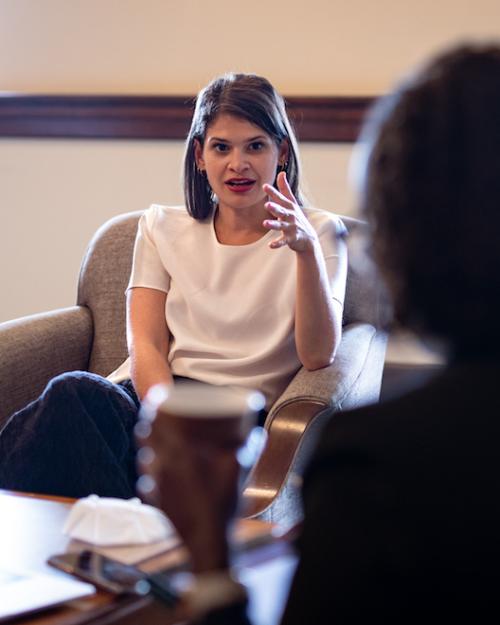It’s exhilarating for media scholar Anna Shechtman to see who shows up on the first day of an introductory media studies class: students from literature and theater, but also from computing, information science, East Asian studies, religious studies and other diverse majors.
“I’ve come in at the start of the course when that question of what media is and what media studies studies is on the table,” said Shechtman, a Klarman Fellow in literatures in English. “And I see everyone’s minds being blown a little bit by realizing the scope and scale of media studies and what it could be. That’s an exciting moment because hopefully they’ll be able to see that whatever work they’re interested in in their own field can participate in this developing discourse.”
Shechtman is at the forefront of the growing media studies field. During her Klarman Fellowship, she is writing a book on the media concept, which presents both problems and potential to scholars.
“Anna's research is a timely intellectual and cultural history of the things we have meant when we have used the word ‘media,’” said Jeremy Braddock, associate professor of literatures in English and Shechtman’s faculty host. “Her book project is remarkably in step with the work we have been doing in media studies over the last several years at Cornell.”
Shechtman bridges the academic study and the real-world practice of media. In 2024, she will join the Department of Literatures in English as an assistant professor, where she will continue to help build Cornell’s media studies program. At the same time, she contributes to public intellectual discourse as a writer, editor, and crossword puzzle creator; she is a humanities editor at the Los Angeles Review of Books, a regular contributor to the New Yorker, and a star in the world of crosswords. (Her book “The Riddles of the Sphinx” about the gendered history of the crossword will be published by Harper Collins.) She also contributes film reviews to ArtForum and the New York Review of Books.
It was through film that Shechtman’s media odyssey began. She arrived at Yale to start a doctoral program in literature and film studies only to find that between acceptance and matriculation, one of her home departments had been changed to “film and media studies.”
Shechtman, a perennial student of language and its evolution, could not stop thinking about the addition of that one word: “What does it mean that we now study ‘media’ and not just ‘film?’” she said. “I began to read a lot in what was a burgeoning field of media studies. It’s rich and diversified and in many ways has little to do with what we were studying in film studies.”
Her investigations grew into her dissertation and now book project, “The Media Concept: A Genealogy.”
“It’s capacious,” Shechtman said. “Media can mean so many things. In many ways it’s even come to stand in for something like ‘culture’ or even the air we breathe, encompassing everything from the books we read to the computers we work on to the coaxial cables that connect us between Europe and the United States. It has this great potential for meaning, but that can also pose difficulty because how do you wrap your hands around this concept?”
In her book, Shechtman looks closely at how the word “media” is used: What’s the difference, she asks, between mass media and mainstream media, and how are those uses different from artistic media? When and how did social networking become social media, and what does that evolution mean?
Through this language-level work, Shechtman hopes to facilitate critical thinking, not just among academics but also across industries including social media sites and broadcasting.
“This is the problem and promise of the media concept: that all these different uses can act as a screen for meaning,” Shechtman said. “On the other hand, it can serve as a bridge between industries and fields of study that can offer new resources for interdisciplinary work and collaboration.”
Shechtman is contributing to growth already underway in media studies at Cornell. In spring 2022, the Media Studies Initiative launched a graduate minor in media studies and sponsors an undergraduate minor. A monthly media studies colloquium brings together scholars from around campus.
“Anna is well equipped to help us continue to knit together the strains and styles of media scholarship from across the university – humanities disciplines, communication, information science, science and technology studies, Cornell Cinema, and our unique collections,” Braddock said.
Shechtman’s next book will continue to connect disciplines: “The Data Concept: A Humanistic Inquiry,” a companion to “The Media Concept,” challenges the idea that “data” has always been the proprietary domain of social scientists, rather than humanists.
She said the Klarman Fellowship is helping her move her long-term research projects forward.
“It’s a luxury to have both the time and the resources of a major research university,” Shechtman said. “It’s invaluable, these three years.”




